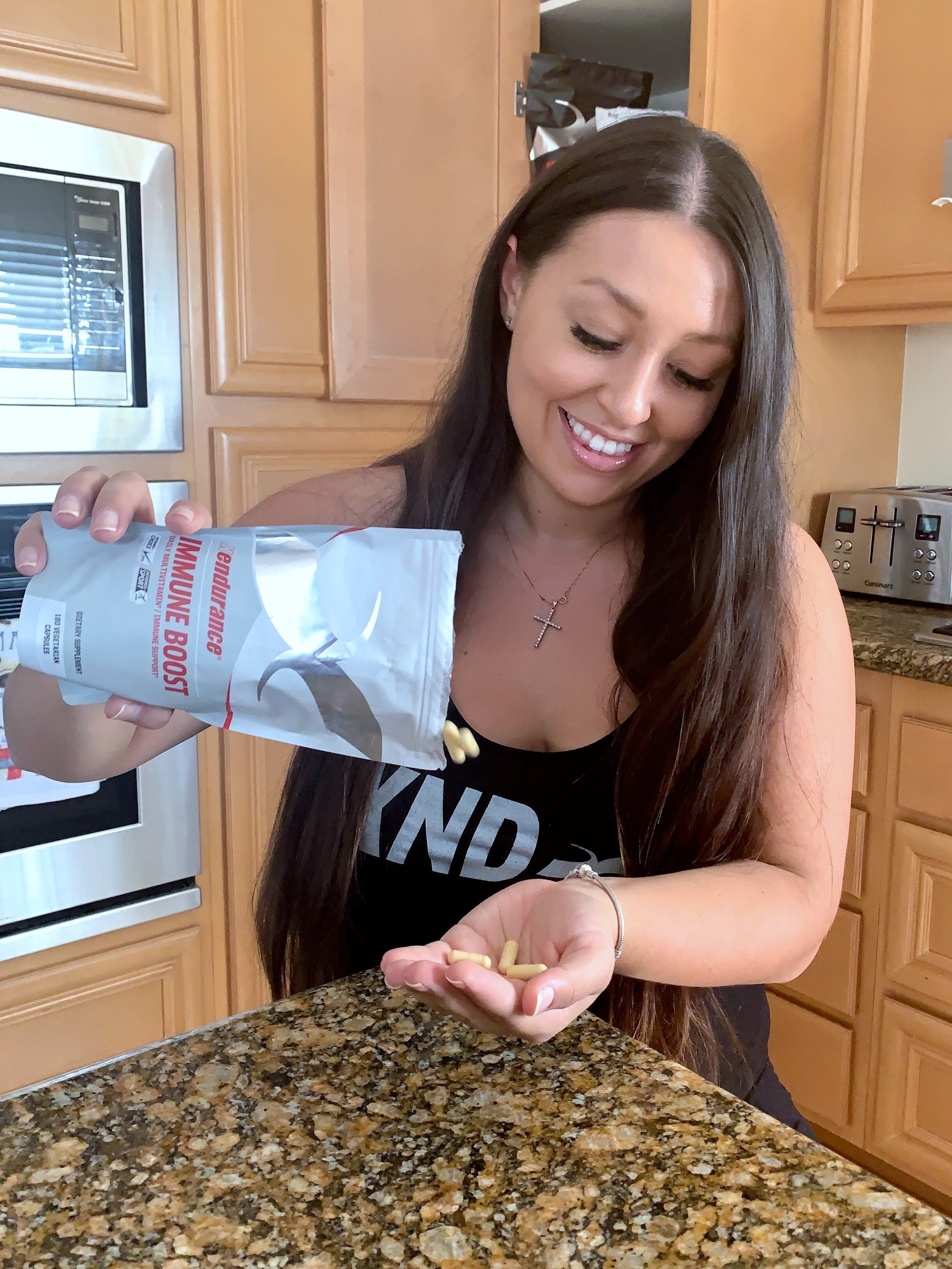Why are carbohydrates getting a bad rap these days? What is wrong with bread and pasta? An apple is healthy, right? Ice cream, maybe not so much. Carbohydrates seem to be front and center when we discuss weight loss, but is there a thing such as carb management or using carb blockers? Do we have to put carbohydrates on the chopping block in order to lose weight?
What Are Carbohydrates and Carb Blockers?
If you are not watching what you eat and consider your diet to be an 'average diet,' you may likely be getting about half of your calories from carbohydrates. Carbohydrates, or carbs, are a type of macronutrient found in many foods and beverages and they occur naturally in plant-based foods, such as grains. Understanding what are carb blockers can help manage how these carbohydrates affect your diet.
There are two types of carbs; simple carbs (sugars) and complex carbs (starch).
Simple carbs have a very basic (simple) structure. To help manage carb intake, some people use carb blocking supplements. But does carb blocker work for everyone? chemical structure. They may bemonosaccharides, which are made up of a single sugar molecule, like glucose. Or they may be disaccharides, which have two simple sugars linked together, as with lactose.
Think of simple carbs as being somewhat easy for the body to digest. Enzymes in the small intestine break down simple carbs before they enter the bloodstream. Any sugar that isn't used right away is stored or becomes fat, and that's why eating foods with lots of added sugar can add to your weight. Once the starch is broken down, other enzymes help these simple sugars or simple carbs be absorbed into the small intestine. Many times these sugars are used for energy but sometimes they are stored as fat. In the case of a triathlete, they may want the stored energy for daily training but most of us don’t need the extra layer of energy (fat). This is where carb blockers can play a role in managing carbohydrate intake.
Complex carbs are made up of longer, more complex chains of sugar molecules. These sugar molecules are called oligosaccharides and polysaccharides. Complex carbs are different than simple carbs in that they take longer to digest than simple carbs do. This means they have a smaller impact on blood sugar, causing it to rise more slowly.
Here is a list of common carbohydrates:
- Grains, Pasta and Breads
- Fruits, Canned Fruits
- Nuts and Legumes
- Starchy Vegetables.
- Milk and Yogurts
- Snack Foods and Soda
- Sauces and Condiments.
But are all these carbs bad? Isn’t fruit good for you? What about your traditional Friday night pizza or your local pasta hangout? Let’s explain what to look for so you can identify if a carbohydrate is good for you or bad for you - and why it is important to know!
Good Carbs vs Bad Carbs
Good carbs are lower in calories, high in nutrients and do not necessarily have refined sugars or refined grains. Good carbs have natural fiber, they are low in saturated fats and sodium and they are very low in cholesterol and trans fat.
Some examples of good carbs are beans, lentils, yogurt, berries, oats, apples, corn and milk. Remember that if you avoid processed foods, you have a better chance at finding good carbohydrates.
Bad carbs tend to be processed - and they are easy to reach for. They are high in calories, full of refined sugars such as corn syrup, white sugar, fruit juices and honey. Bad carbs are low in fiber, nutrients and high in sodium. Some bad carbs have cholesterol and trans fats along with saturated fats.
Some examples of bad carbs are white bread, white pasta, pastries, beer, sugary sodas, pancakes, pizza dough - yes, your Friday night pizza is on the list - and even some fruit juices.
You might want to hang a list of good carbs and bad carbs somewhere in your kitchen. We all tend to grab the easiest to consume food items in this hectic world we live in and those choices can pack on the bad carbs fast!
Can You Eat Carbohydrates And Still Lose Weight?
Here is where a carb blocker comes in. But are carb blockers bad for you? Understanding their function is crucial.
If you have ever watched the Avenger movies, there is a character called Heimdall and he is the sole protector of the Bifröst (gate) in Asgard. Okay, if you haven’t seen the movie, he is the one Avenger character who doesn’t let anything get through the gates. He blocks everyone…and does his job quite well.
So think of a carb blocker as Heimdall. He stands at his post and fiercely blocks carbs from being absorbed into your body. But how does a carb blocker work? Heimdall had a sword to keep the bad guys out. What does a carb blocker use to defend and keep the carbohydrates out?
Carb blockers for weight loss were introduced for those of us who like pasta - or really for all of us wanting to drop a few pounds. Carb blockers interfere with digestion and help decrease the calories we get from carbs. These natural carb blockers also help reduce spikes in blood sugar and insulin resulting in weight loss. But how do they block the calories?
Starches are identified as complex carbohydrates. Complex carbohydrates can’t be absorbed unless they are first broken down by the digestive enzyme amylase. Starch blockers are known as amylase inhibitors and they prevent the starches from being absorbed into the body. You don’t absorb the calories because the amylase blocked those carbs from passing through the body. They go through undigested so you don’t absorb more calories. So yes, carb blockers work because you don’t add on calories.
What Type Of Carb Blockers Are There?
There are two main types of carb blockers; one is White Kidney Bean Extract and the other is Alpha-Glucosidase Inhibitors (AGIs). Both of these carb blockers work by impeding different enzymes that are needed for carbohydrate digestion. Knowing when to take carb blockers can enhance their effectiveness.
White Kidney Bean Extract is one of the most popular and well researched carb blockers on the market. It works by inhibiting the enzyme, amylase, which breaks specific bonds that hold starch together. The White Kidney Bean carb blocker can be found in several supplements touting weight loss or carb blocking benefits.
A study group of overweight men and women took white kidney bean extract for 3 months and on average lost approximately 7 pounds. The results also showed that white kidney bean extract lowered blood glucose, but it varied on the amount each participant consumed.
Alpha-Glucosidase Inhibitors (AGIs) are a type of prescription medication used in the treatment of high blood sugar and are many times used with type 2 diabetic patients. Doctors prescribe carb blockers to help lower blood sugar with those have diabetes. The prescriptions or medicines known for carb blocking effects are made by fermenting microorganisms. With the AGIs, they work by blocking the action of an enzyme called alpha-glucosidase that helps cut chains of sugar molecules into smaller pieces in your small intestine. AGIs usually do not come in supplement form but an extract that comes from the Salacia plant provides a natural source of alpha-glucosidase.
Does A Carb Blocker Help With The Keto Diet?
If you are on a keto diet, then your are probably not consuming a lot of carbohydrates anyway. Some ketogenic dieters, however, want to become carb cutters. (probably because they have cheated) There is no harm in taking carb blockers but you probably already know that eating too many carbohydrates will kick you out of ketosis - or knock your keto diet off balance - and that’s probably why some use carb blockers to become carb cutters!
The Verdict: Carb Blockers Work!
When you are trying to get into that swimsuit or a dress that has been sitting in your closet for years, carb blockers for carb management could be the answer. But let’s also remember why you are looking for carb blockers and the health hazards of obesity or being overweight; diabetes, cardiovascular disease and metabolic syndrome to name a few. Controlling your diet and exercising is vitally important even when you decide to use carb blockers; either carb blocking medication or carb blocking supplements. Carb blockers do work but they are only part of the solution. And remember, the choices you make on your diet and exercise can help the carb blockers work much, much faster and you may be fitting into that dress sooner than you think!









Leave a comment
This site is protected by hCaptcha and the hCaptcha Privacy Policy and Terms of Service apply.